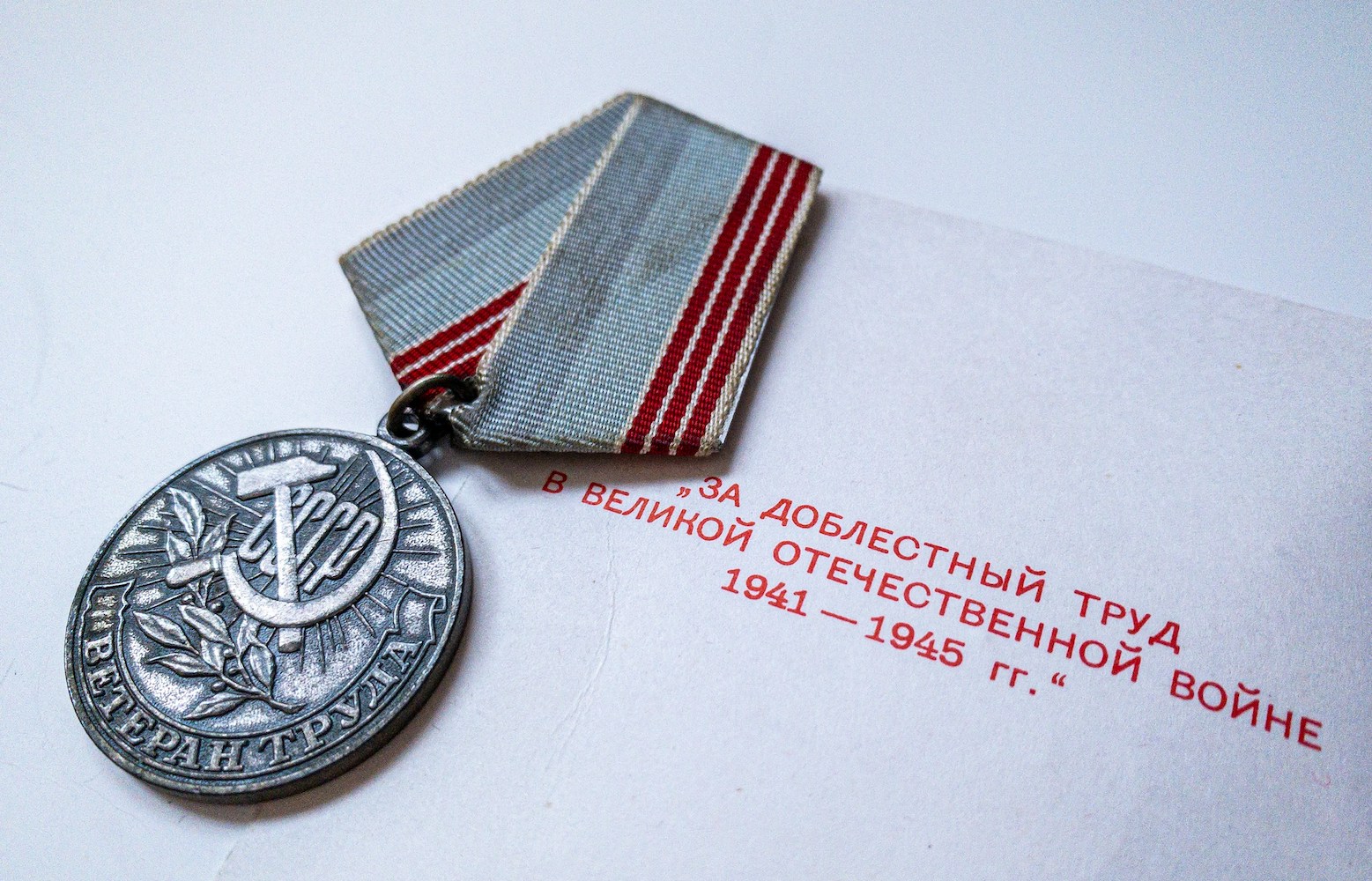news
The 2012 National Book Awards

1. At $1,000 a plate, dinner wasn’t cheap. 2. Martin Amis gives Elmore Leonard a droll intro.
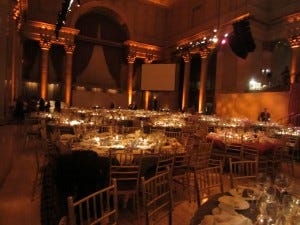
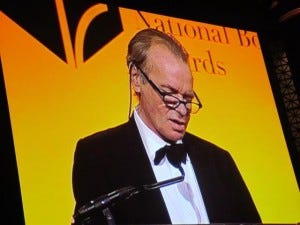
At last year’s National Book Awards — at Cipriani Wall Street — it was hard not to feel a tad uncomfortable. After all, we were in such an opulent space, dressed up, eating and drinking and chatting (it’s a $1,000 a plate dinner); while nearby sat the Occupy Wall Street encampment, protesters huddling in the rain. Only the poet Ann Lauterbach, who introduced John Ashbery, made mention of the incongruity.
On November 13, the Awards were held once again at the Cipriani — this time in the aftermath of Hurricane Sandy. Walking the streets of the financial district, the aftermath of the storm was evident. Yet the mood inside was festive, with many sharing stories of their storm experiences and expressing gratitude at having heat, electricity, and hot water again. Oh, and people gossiped about who might win the fiction award, who deserved it, and so on.
1. Publishing honchos Nan Graham (Scribner), who is lovely, and Viking’s Paul Slovak, who is very tall. 2. Here’s Leigh Newman, author of forthcoming memoir Still Points North, with New York mag’s Boris Kachka.
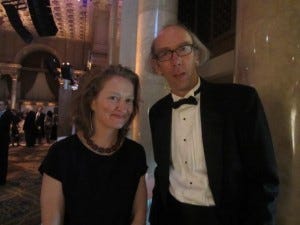
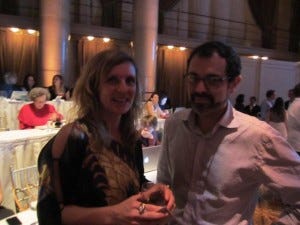
The luminaries of the publishing world were gathered, above all, to celebrate themselves. There were publishing power players — such as HarperCollins’ Jonathan Burnham, Nan Graham from Scribner, and Knopf’s Sonny Mehta — along with publicists, agents, editors, and authors. With such an impressive list of fiction nominees this year, including Dave Eggers, Junot Díaz, and Louise Erdrich, there seemed to be more at stake than usual in selecting a winner. (Though it must be said, the nominees seemed remarkably calm before the ceremony.)
Hosting the 63rd National Book Awards was Faith Salie, whose remarks were a combo of witty zingers and predictable jokes about being an exhausted mommy and reading Goodnight Moon.
First up was Arthur O. Sulzberger, Jr., chairman of the New York Times, who received a Literarian Award. (This was presented by NPR’s beloved Terry Gross.) After Sulzberger was back at his table, I resisted the impulse to approach him and complain about the spotty home delivery of my Times subscription, the lack of poetry coverage in theTimes, and the off-putting tone of so many of their book reviews. Maybe I was just cranky because the ceremony didn’t start until 9:45pm(!). This wasn’t the Oscars, you know. We were books people, and we were tired. Most of us just wanted to be at home in bed, reading.
1. Young People’s winner William Alexander, whose daughter, Iris, was born just a few weeks ago. Much to celebrate. 2. Poet David Ferry teared up when giving his acceptance speech, which made everyone in the audience say, “Aww!”
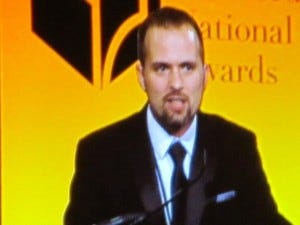
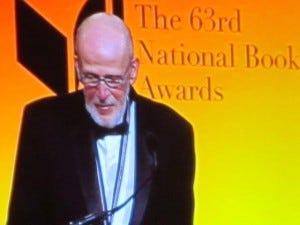
Next up was the diminutive but distinguished author Martin Amis, who presented the Medal for Distinguished Contribution to American Letters (whew!) to Elmore Leonard. Being a Brit, Amis indulged in some cheeky humor, what the English call “taking the piss.” But Amis’ admiration for Leonard was obvious. He described him as being “as American as jazz,” and noted that Leonard “doesn’t just show you what his characters see and do, he shows you how they breathe.” As he took the stage to make his speech, Leonard was irreverent and funny. He said he’d been writing fiction for 60 years, an astonishing span of time, and that of the many reviews he has received over the decades, his all-time favorite described him as “the poet laureate of assholes with revolvers.”
Then it was awards time. William Alexander graciously accepted the prize for “Young People’s Literature,” which is kind of a funny name for a category. Who are these Young People? Are they living in Bushwick and Greenpoint? Or are they still in middle-school? Regardless, with a title like Goblin Secrets, Mr. Alexander’s novel — which presumably reveals the secrets of goblins — must surely appeal to Young and Old alike.
Next, poetry. Here, one might expect a long-winded speech from the winner, greedy for a rare moment in the spotlight. But no. The problem here was a long, rather boring introduction to the nominees, with the winner’s name tossed in almost imperceptibly at the end: David Ferry. Many in the crowd grumbled over this, rightly so. It was just past 10pm. Ferry, who won for his collection Bewilderment, gave a brief, self-deprecating speech, wondering if the judges had taken pity by giving him a “pre-posthumous award.” (He is eighty-eight years old.)
1. There are few people, writers or otherwise, cooler, funnier, or more awesome than Lorrie Moore. That is all. 2. Fiction champ Louise Erdrich, the big winner of the night.
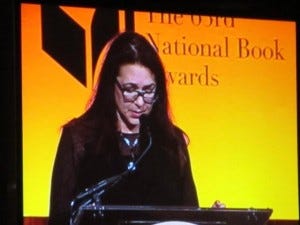
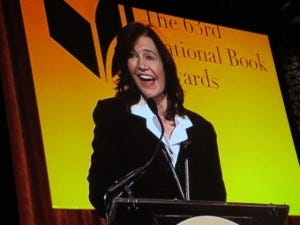
Katherine Boo won the nonfiction award for her amazing book, Behind the Beautiful Forevers, and thanked her subjects for allowing their stories to be told.
Finally, the big moment arrived: Fiction. The tension in the room was palpable. Or maybe it was just that so many people needed the bathroom. (The lines earlier in the evening had been unbearably long, causing many would-be bathroom users to abandon hope and head back to their tables.) Lorrie Moore, the panel chair, stepped up to the podium. When she announced Louise Erdrich as the winner, the room erupted in happy cheers, applause, and much jumping up and down. Erdrich gave a wonderful, gracious speech, partly in Ojibwe.
Considering the talent of each of the fiction writers nominated, this was a tough year to be a nominee. But people seemed universally pleased for Erdrich, whose novel The Round House, if you’ve read it, is a literary masterpiece and will surely prove to be an enduring one. So none of the nominees visibly wept or cursed at not hearing their own name announced. In fact, after the ceremony Dave Eggers confessed that he was relieved. The pressure was off, and he was quite thrilled for Erdrich.
1. Stephanie Valdez, co-owner of Park Slope’s great Community Bookstore, with the store’s events coordinator, Michele Filgate. 2. Ben Fountain, nominated for his novel Billy Lynn’s Long Halftime Walk, with his delightful family.
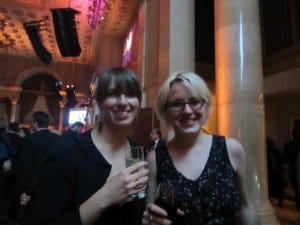
1. Writers gettin’ crazy on the dance floor. 2. Adam Rathe and friend.
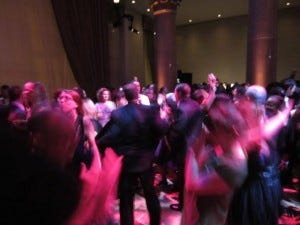
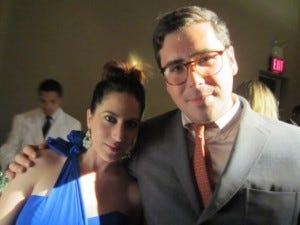
Then it was time to party at the after-party. Everyone made their way to the mezzanine level for dancing, drinking, photo boothing, and shouting above the brutally loud music. And eventually, maybe around midnight or so, it was time to head home.
***
— Carmela Ciuraru is the author of Nom De Plume: A (Secret) History of Pseudonyms. She lives in Brooklyn.








